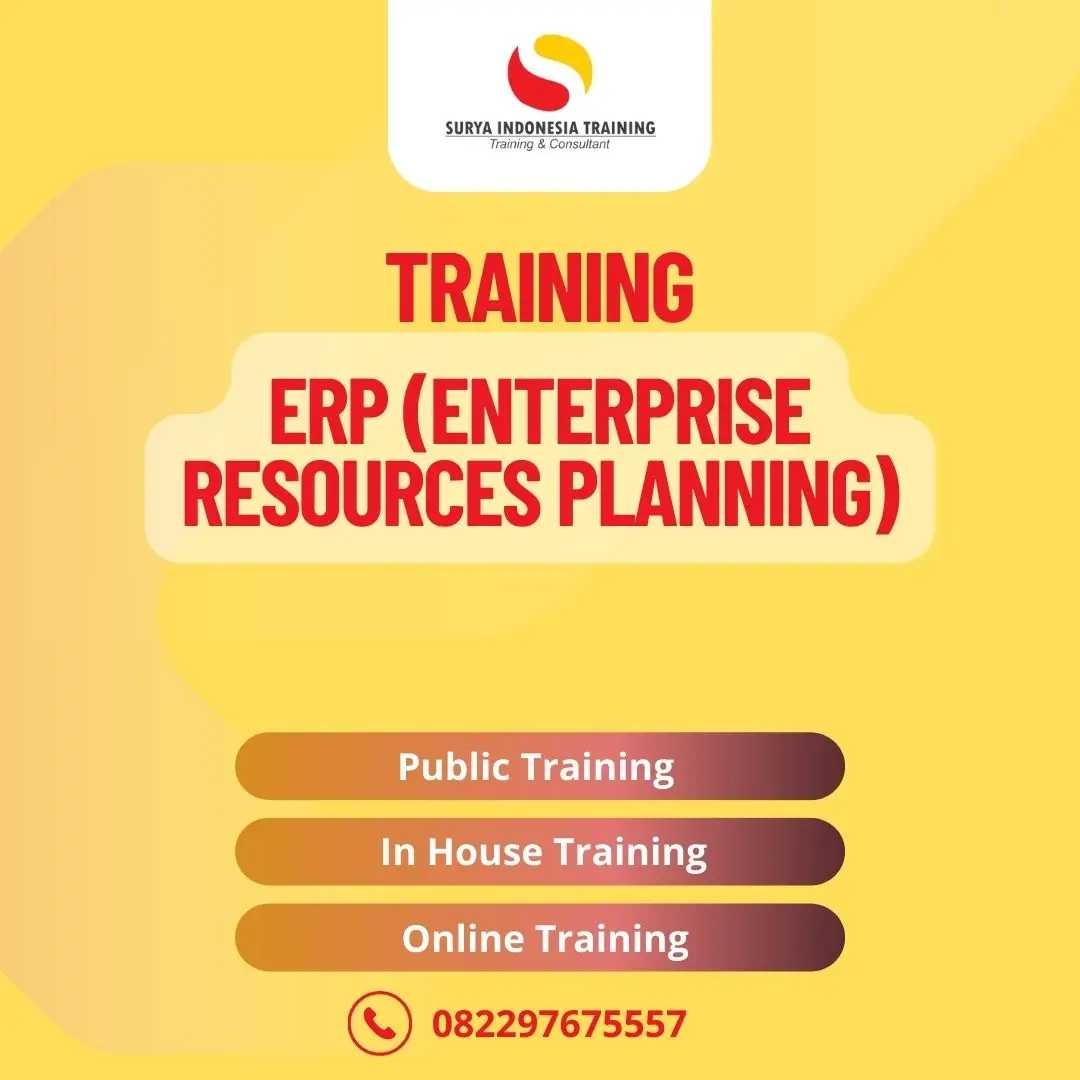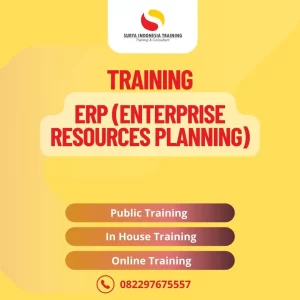
Description Training ERP (ENTERPRISE RESOURCES PLANNING) ONLINE
ERP (Enterprise Resource Planning) training equips individuals with the necessary skills to effectively utilize ERP software solutions for managing business processes such as finance, human resources, manufacturing, supply chain, and more. This training covers system navigation, data input, report generation, and optimization techniques to enhance organizational efficiency and productivity.
Objectives Training ERP (ENTERPRISE RESOURCES PLANNING) OFFLINE
- Understanding ERP fundamentals: Familiarize participants with the basic concepts, principles, and components of ERP systems, including modules such as finance, HR, supply chain, etc.
- Mastering system navigation: Enable participants to confidently navigate through the ERP software interface, accessing different modules, menus, and functionalities efficiently.
- Data management proficiency: Teach participants how to input, modify, and manage data within the ERP system accurately, ensuring data integrity and consistency across the organization.
- Reporting and analysis skills: Train participants to generate and interpret various reports and analytics provided by the ERP system, enabling informed decision-making and strategic planning.
- Optimization and customization: Equip participants with the knowledge and skills to optimize and customize the ERP system according to the organization’s specific requirements, enhancing productivity, and maximizing the system’s value.
Materials Training ERP (ENTERPRISE RESOURCES PLANNING) INHOUSE
- Training manuals: Comprehensive guides covering ERP fundamentals, system navigation, data management, reporting, and optimization techniques.
- Interactive presentations: Engaging slideshows or multimedia presentations illustrating key ERP concepts, processes, and best practices.
- Hands-on exercises: Practical activities allowing participants to practice using the ERP software, inputting data, generating reports, and customizing settings.
- Case studies: Real-world scenarios demonstrating how ERP systems are implemented and utilized in different industries, highlighting challenges and solutions.
- Online tutorials: Accessible video tutorials or e-learning modules covering various aspects of ERP training, suitable for self-paced learning.
- Webinars: Live or recorded webinars led by ERP experts discussing advanced topics, industry trends, and best practices in ERP implementation and usage.
- Simulations: Virtual simulations providing a simulated environment for participants to practice using the ERP system in a risk-free setting.
- Quizzes and assessments: Assessments to evaluate participants’ understanding of ERP concepts, identify areas for improvement, and track learning progress.
- Job aids: Quick reference guides, cheat sheets, and troubleshooting resources to help participants navigate the ERP system efficiently and address common issues.
- Collaboration tools: Online forums, discussion boards, or group activities promoting peer-to-peer learning and knowledge sharing among participants undergoing ERP training.
Participants Training ERP (ENTERPRISE RESOURCES PLANNING)
- ERP Administrators: Individuals responsible for the setup, configuration, and maintenance of the ERP system. They require in-depth knowledge of the software’s technical aspects, customization options, and integration with other systems.
- Department Managers: Managers from various departments such as finance, HR, supply chain, and operations who need to understand how to leverage the ERP system to streamline processes, track performance metrics, and make data-driven decisions within their respective areas.
- IT Professionals: IT staff tasked with supporting the ERP system, troubleshooting technical issues, ensuring data security, and managing system upgrades or migrations. They need training to effectively manage the ERP infrastructure and address any technical challenges.
- End Users: Employees across different roles and functions who interact with the ERP system on a day-to-day basis for tasks like data entry, reporting, and accessing information relevant to their job responsibilities. They require training on basic system navigation, data input procedures, and understanding relevant features.
- Executives and Decision-Makers: Senior leaders who rely on ERP-generated insights for strategic planning, resource allocation, and performance monitoring. They need training to interpret ERP reports, understand key performance indicators, and make informed decisions based on the data provided by the system.
PEMATERI/ TRAINER JAKARTA
Pelatihan ini akan diberikan oleh Trainer dari kalangan Praktisi, Akademisi dan Konsultan berpengalaman di bidangnya masing-masing.
FAQ tentang Surya Training
Q : Berapa minimal running pelatihan ini ?
A : Pelatihan ini akan running idealnya minimal dengan 3 peserta
Q : Apakah bisa jika saya hanya ingin pelatihan sendiri aja / private course ?
A : Bisa, kami akan membantu menyelenggarakan pelatihan 1 hari jika ada persetujuan dari klien
Q : Dimana saja pelatihan biasanya di selenggarakan?
A : Pelatihan kami selenggarakan di beberapa kota besar di Indonesia seperti Bandung, Jakarta, Yogyakarta, Surabaya, Malang, Bali, Lombok dan beberapa negara seperti Singapore dan Malaysia
Q : Apakah bisa diselenggarakan selain di kota lain?
A : Penyelenggaraan pelatihan bisa diadakan di kota lain dengan minimal kuota 5 orang setiap kelas
Q : Apakah bisa juga diselenggarakan secara IHT/ In House Training di Perusahaan klien ?
A : Bisa diselenggarakan secara IHT di Perusahaan klien
Q : Apakah jadwal bisa disesuaikan dengan kebutuhan klien ?
A : Jadwal pelatihan dapat di sesuaikan dengan kebutuhan klien. Namun konfirmasi minimal 2 minggu sebelum pelaksaan pelatihan.
Informasi lebih lanjut
Customer Service : +62 821-1058-4566 (Available WhatsApp)
email : cro.suryatraining@gmail.com
JADWAL TRAINING BANDUNG 2024
16 – 17 Januari 2024
13 – 14 Februari 2024
05 – 06 Maret 2024
24 – 25 April 2024
21 – 22 Mei 2024
11 – 12 Juni 2024
16 – 17 Juli 2024
20 – 21 Agustus 2024
17 – 18 September 2024
08 – 09 Oktober 2024
12 – 13 November 2024
17 – 18 Desember 2024
Jadwal tersebut juga dapat disesuaikan dengan kebutuhan calon peserta






